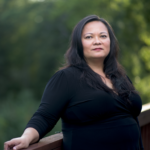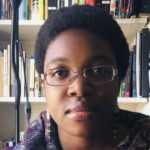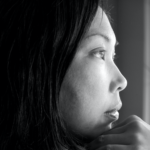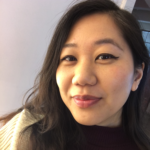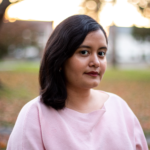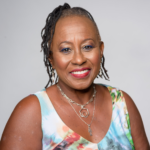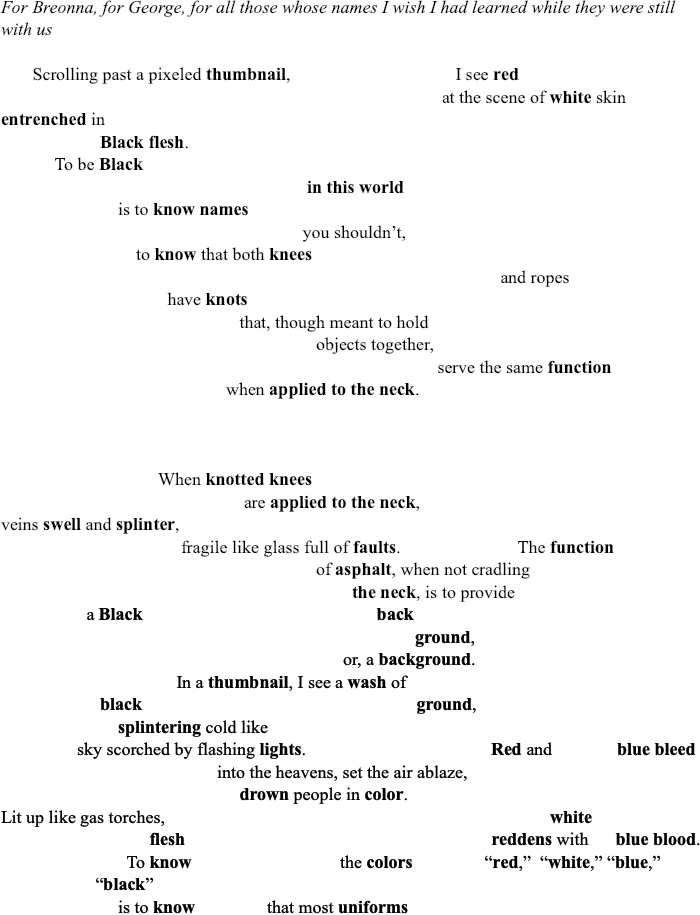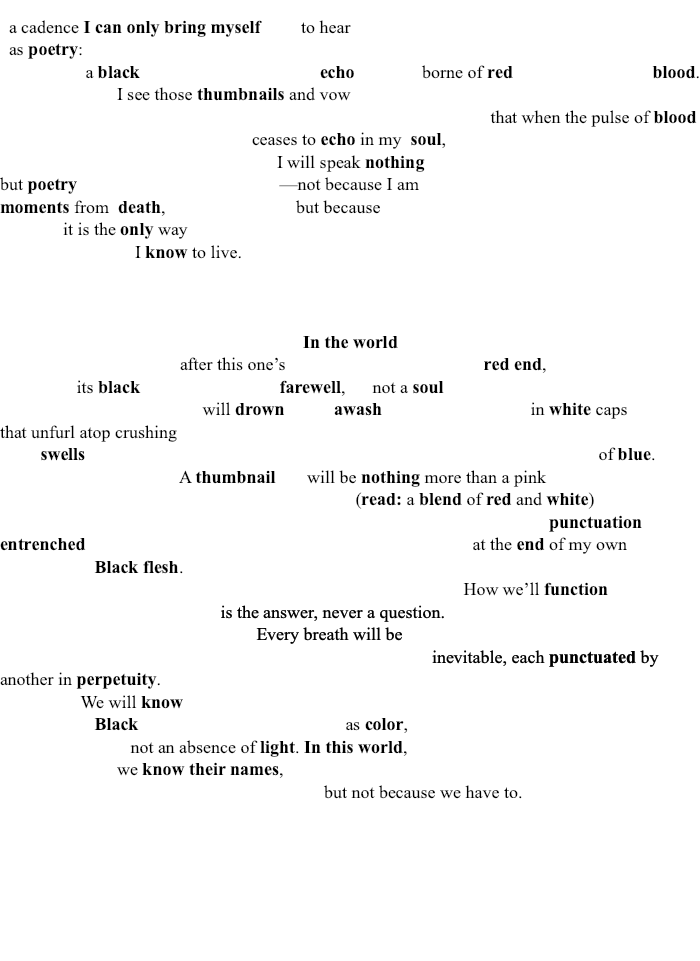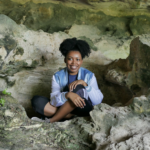FRESH OFF THE PLANE
I
One week after your arranged marriage, on your maiden intercontinental flight from Ahmedabad International Airport to Dallas Fort Worth, you will sit next to your husband for more than 24 hours, half of which the two of you will spend sleeping, exhausted from your four-day-long wedding celebration, a hurried trip to Bombay to get your visa, and a small rooftop reception at his house. The devastating aftermath of the 2001 Gujrat earthquake, two days before your wedding, is still being felt in the aftershocks of the land and people’s consciousness, and though you are not superstitious, you can’t help but wonder what it portends for your arranged-marriage-wedded life to come.
II
On that same flight, somewhere over Cairo, Egypt, when you both finally wake up, he will head to the bathroom to brush his teeth and gargle with the small bottle of mouthwash kept in the cabinet above the tiny basin.
Six months later, after the two of you have settled into your domestic life, you will scoff at each other’s dental hygiene routine—he brushes his teeth first thing in the morning, you like to do it after drinking a tall glass of water and a cup of strong adrakwali chai, made the way you have always liked, one-fourth cup of milk, three-fourths cup of water, two teaspoons of sugar, one teaspoon Brook Bond Red Label loose tea leaves, freshly grated ginger root, boiled till the chai is terracotta brown.
He will tell you he grew up drinking tea made with Vagh Bakari (lion and goat) tea leaves, a brand whose television ad you had watched with derision for how it turned a dominating mother-in-law into a docile, motherly figure after drinking the tea her daughter-in-law made. As if tea could solve differences and strengthen marital ties.
A month after settling in your one-bedroom apartment, you will start buying both brands and mixing the tea leaves in a big container, so the flavor of Vagh Bakari and the color of Brook Bond can be enjoyed with the morning cuppa.
He will start making the morning tea, because you can never wake up early enough to make it for the both of you. He’ll tell you he is thankful you didn’t choose to be a doctor, or your patients would’ve died waiting for you to get up and make your morning cup of chai.
III
The only chai that is offered on the Lufthansa plane is a paper cup of warm water with a tea bag seeping in it. You don’t care for the tepid flavored water, so you switch to coffee with milk and two sugars. He drinks black coffee, a habit he picked up after living in America for the last two years. In time, you will grow to appreciate the dark roasts at local coffee shops but will always add a generous splash of milk, two sugars and a sprinkling of nutmeg that will remind you of Ma’s instant Nescafe with a dash of nutmeg.
It is morning somewhere over the American continent when you realize that all the coffee you drank is pushing against your bladder. In the tiny bathroom of the Lufthansa plane, you will hitch up your kameez, and struggle to untie the strings on your salwar so you can squat on the cold steel toilet to pee, wash your hands and straighten your clothes and swirl the mint green liquid that stings your tongue, spray perfume under your armpits and behind your ears because you want your husband of one week to think you can smell of peaches and roses and minty fresh breath 38,000 feet above the earth.
A few weeks later, you will hear his discourse on why stereotypes about Indians are not that far off in his circle of acquaintances—body odor (they don’t wash their clothes often), bad breath (smell of spicy food lingers), bad posture (hunched shoulders). In time, you will start noticing these things too, and then adding your own anecdotal observations to his list—horizontal stripe T-shirts, oily hair, mustachioed men mumbling out last syllables.
IV
When the mustachioed friend of your husband picks up the two of you from the airport, you will sit in the heated cocoon of his Honda Civic (desis drive Hondas and Toyotas, reliable, dependable cars with a good resale value) and listen to the two men from the back seat of the car talk about green cards, parking garages, weather, a big garbage bag full of his mail, friends who cleaned his apartment during his three-week India vacation to get married. The mustachioed man will drop the two of you at the 750 sq. ft. first-floor apartment with one bedroom, living room, galley kitchen. He will help bring in the luggage, four big suitcases and two carry-ons.
You will walk in the apartment, over the rose petals strewn on the beige carpet, past the entrance, balloons and buntings on the speckled white walls, the living room with two brown leather couches and a big screen TV, a grey plastic patio dining table in one corner, to the small bedroom with a queen-sized bed, wood and wrought iron bedframe, a particle board office desk, a desktop and keyboard.
The fact that you are in a foreign land where the ritual of stepping over your husband’s threshold will not involve a container of rice that you will topple with your toes will hit you with a force that you are not prepared for.
Over the years, you will miss out on many more rituals and festivals and celebrations, but for now, you circle back to the living room just as the heater kicks in. You sink on the leather sofa, that’s called a couch, and look around the apartment that’ll be your home for the next five years.
V
It takes five seconds for a 911 call to go through but you don’t know that when on your first day you decide to call home and let your parents know you’ve reached America and not to worry, it’s very cold here but the apartment is warm and cozy and you feel fine, just a bit tired and yes, you will call later, you need to hangup because by then you are tearing up and realizing how far away from home you are, but this is your home now and you will have to make the best of it with your husband who is talking you through the steps of making the international call, dial 91, then city code, then area code, then phone number.
You will dial 911, realize your mistake and hang up.
Him: “Did you call 911?
You: “No.” It couldn’t have possibly gone through.”
A second later, the phone will ring. He will answer it.
911 Operator: “Sir, we received a call from this number.”
Him: “Yes, my wife dialed by mistake. She was trying to call India.”
911 Operator: “Sir, get off the speaker phone and get her on the line.”
He will hand the phone to you, his face turning shades of red at the implicit accusation in the operator’s voice.
You: “Hello?”
911 Operator: “Ma’am, did you call 911?”
You: “Yes. I’m sorry. It was a mistake. I was trying to call India.”
911 Operator: “Ma’am, are you sure you are not in any danger? I can send an officer over.”
You: “No, I’m fine. Really.”
911 Operator: “Okay Ma’am. Have a good night.”
The silence in the 750 sq. ft. apartment as you unpack your suitcases will be as loud as the hum of the heater so the knock on the door ten minutes later will be heard immediately. Standing outside the door will be a tall policeman, asking your husband who called 911. He will be blond and blue-eyed, just like the cops you’ve seen on TV. Your husband will point to you, standing a little bit behind him, and explain, once again, that his wife was trying to make an international call. He’ll be asked to go in the other room, so the policeman can talk to the lady of the house. You will again repeat your story, tell him this is your first day in America and you are tired, and jet lagged, and it was just a mistake, really.
The six-foot-tall policeman with his piercing blue eyes and thick Texan accent will look at the rose petals on the carpet, at the balloons and bunting on the walls, the open suitcases in the middle of the living room, and then he will tip his hat with a slight smile, mumble something into a walkie-talkie and wish you both a good night as he leaves.
The poise and confidence you thought you were projecting so far to impress your husband will be shattered by the debacle of the 911 call and though the two of you can’t laugh about it now, in the future, you will be able to tell your friends about this with self-deprecating humor as he shakes his head at your frivolity.
This will end your first night in America, sleeping on your marital bed with your husband who seems to have calmed down from the humiliation of being obliquely accused of domestic battery. That night, you will also find out that your husband snores, that he needs the fan on every day of the year, that the bed you are sleeping on has a mattresses on top of a box spring (in India, you have slept on firm mattresses re-stuffed every year with cotton batting), a fitted sheet (only in America), and a comforter that does not warm your feet as quickly as the razai you left back home.
VI
Before you lie down and wrap your cold feet in the warmth of the comforter, before you call 911 by mistake, you will go out to dinner with his friends, two men and a woman, to a neighborhood Italian restaurant. They are the ones who cleaned and decorated the apartment with rose petals, buntings and balloons, to welcome you to the country. He will see you shivering in your salwar kameez and leather jacket and turn on the car heater full blast and the passenger-side seat warmer. The ten-minute ride to the restaurant will feature dark, empty streets, twinkling lights in the surrounding apartment buildings, a strip mall with a gas station, a dry cleaner and a laundromat next to the Italian restaurant and a Great Clips.
You have never eaten Italian food except for pizza, so you will let the only other woman in your group order something for you. She says eggplant parmesan is a safe bet, and your husband will ask if that’s ok and you will say yes even though you don’t like eggplant. It is not like you to eat foods you don’t like but you are tired. On the flight you’ve already listened to his rant about how he hates that his brothers and parents are so fussy about food. He has lived by himself for seven years and doesn’t care how the food tastes if it fills him up. So, you will swallow the eggplant parmesan with sips of water and listen to his friends talk about work and green cards and parking garages and how much mail your husband will have to sort through.
In the coming weeks, you will start a losing battle with junk mail because your husband is paranoid about identity theft. He will not want you to throw anything away with his name and address on it. Instead, he’ll take it to work every few months and shred it there. In the meantime, it will pile up on the plastic patio/dining table and you will sort it as bills, junk mail, catalogues, coupons. In a couple of months, you will give up the sorting, because you are a realist who knows creating order out of chaos is futile.
VII
There is an order to international travel that you won’t appreciate when you are jet lagged and weary, standing in line at the airport gate clutching your carry-on luggage. The stewardess scanning your ticket and passport won’t care about the pronunciation of your name. All she will care about is if the spellings in the two documents match. You won’t know it when the customs official at Dallas Fort Worth International scans your passport and stamps, but from here on, you will forever spell your name like a code being transmitted over the police scanner: “First name Jaya, spelled Juliet, Alpha, Yankee, Alpha. Last name, Wagle, spelled Whisky, Alpha, Gerald, Larry, Elephant.”
Even though you can speak and write proper English, you will have to relearn words, pronunciation and different meanings of American English: Lift is not an elevator but a ride; ladyfinger is a dessert, not the vegetable okra; coriander is cilantro; brinjal is eggplant; “good for you” can be used to patronize or compliment, same with “bless you”; your name, in Spanish, is pronounced Haya, in English Jaaya. You will learn to spell in American English, substituting ‘z’ for ‘s’ and ‘o’ for ‘ou’ or else red squiggly lines will appear under colour and realise.
These realizations will come slowly but nobody will make you more aware of your Indian accent and British English than a high schooler working behind the front desk at the local natatorium where you will take adult swimming lessons because it is Texas and everyone swims in the summer and you have always wanted to learn to swim. When you approach him to ask for a schedule of practice hours, he will say, “What? What is it you want?” You can hear him and his buddies sniggering, but you won’t know why so you will repeat the question. “I want the schedule for practice hours.”
High Schooler: “The what for practice hours?”
You: “You know, a list of times I can come and practice my swimming.”
More sniggering.
High Schooler: “Oh, you mean a schedule. Here you go.”
As you walk away you will hear laughter behind your back. Later, your husband will tell you “schedule” is pronounced with a “sk” sound and not the “sh” sound you had grown up with. You will never speak schedule with a sh sound ever again, and no matter how much you try to modulate your ‘a,’ ‘e’ ‘g’ and ‘j’ sounds, there will always be high schoolers of all ages laughing at your pronunciation and your accent.
The exception to the rule will be old women in your library writing group who will wonder how you manage to not only speak but write in English so well.
“How long did you take to learn English?” they will ask.
“I learnt it growing up.”
“In India? That is amazing!”
And you will smile and nod and accept the compliment because they remind you of your grandmother and you don’t want to explain to them how English is taught in schools and you went to a convent school, one of many established during the British Raj to raise a class of bureaucrats and clerical staff conversant in the Queen’s English, where you not only spoke and learnt English language skills, all your subjects were also taught in English. It is easy for you to relinquish rhetorical control when faced with the elderly.
VIII
How do you take control of your life after an arranged marriage, in a foreign country, confined to a 750 sq. ft. apartment while an icy rain falls outside?
You will watch a lot of TV (Friends and Seinfeld reruns, Frasier and Saturday Night Live), familiarize yourself with the local mall, shop at the Gap, get a haircut at ULTA, visit Sam’s Club and Walmart every weekend, buy ginger and tea leaves and a stainless steel pot with a lip and a strainer to make your chai, eat Pringles and Ferrero Rocher for lunch, read The Bridges of Madison County and The Bluest Eye, and a few months later, you will start going to the apartment gym because your clothes are tighter than they should be on the waist.
IX
You will quickly realize that there is a lot of choice in America when it comes to clothing, so much in fact that on your first trip to the mall you will gawk at all the glass-fronted stores of brand names you have heard of (Tommy Hilfiger, Calvin Klein, Ray Ban) and the ones you haven’t (Chanel, Louis Vuitton, Balenciaga). You will buy blue jeans from the Gap, and a shift dress from The Limited, and you will look at the price tags and quickly convert them to Indian rupees. Over time, you will unlearn the subconscious habit of converting dollars to rupees, but in that first year, you will be conscious of how much of your husband’s money you are spending at the Gap, Pier 1 Imports, Target and Old Navy. You will revel in the joy of fuss-free-returns until one day your husband gets exasperated, driving you from store to store over the weekend to return or exchange merchandise because you don’t have a driver’s license or a car.
X
His exasperation will make you reconsider your daily routine and you will enroll in the nearby community college for a weekly fiction writing class. Every Wednesday evening, he will drive you six miles to the college and wait for you in the empty cafeteria while you sit with seven other students and a silver-haired teacher named Bette Wisapape around an oval table, discussing the difference between show and tell and importance of sensory details in storytelling.
In that class, you will hear for the first time an old lady who seemed to be justifying slavery, stating, “Didn’t the black people capture other black people and sell them into slavery?” This will be your first brush with racism that is not directed at you–but it will not be not your last.
In that same class, you will also make friends with a blonde-haired, green-eyed girl, an insurance claims adjustor, who will write a story based on her experience as a prison guard in a Wyoming jail. She will become one of your best friends in your adopted country, eventually holding one of your legs in the hospital room as you give birth to your six-pound son. Your husband will be holding the other leg, an incident that will cause shock and awe in your family since Indian husbands typically pace outside the birthing room instead of assisting in the birth of their children.
XI.
Before your son is born, before you join the community college and make a friend, you will rearrange the apartment, because you have time on your hands. You will realign the couches and the TV in the living room and stack all the books in the apartment in the middle of the living room to simulate a coffee table. You will drag out the big, pressed wood computer desk out of the bedroom, and put it in the living room where it will sit at a right angle to the TV. The bedroom will look bigger without the computer desk. You will replace it with a $10 particle board side table from K-Mart and use it for your books, creams and earrings.
During one of the cleaning sprees of the small walk-in closet in the bedroom, you will come across a sheaf of papers with an English translation of Kamasutra. You will sit on the carpeted closet floor, reading the descriptions of the acrobatic, erotic poses and wonder why your husband printed them. You will call your husband at work and read some of the text to him and ask him about his intentions. He will start laughing and so will you because read out loud over the phone, they sound ridiculously impossible to perform without spraining an ankle or wrist. Soon, the two of you will start going to the apartment gym because you are both getting out of shape, lying on the couch together, watching Food Network and exploring the hitherto unknown joys of first, second, third and fourth base.
XII
At the apartment gym you’ll watch BET and run on the treadmill and the elliptical and watch sculpted bodies gyrate to Jay-Z, J Lo, Mary J. Blige, Alicia Keys, Usher, Ginuwine, Outkast. The songs and videos are such a contrast to your own mellow tastes in Hindustani classical music with its emphasis on lyrics and melody based on raagas, taal and sur. But you enjoy listening to the fast-paced music while walking to nowhere on the treadmill.
You’ll make friends in this gym with a girl from India. She and her husband will become close friends with the two of you. You’ll all go on vacation to New Mexico, stay at KOA camps overnight (your first camping experience that will remind you of sleeping under the stars on the flat rooftops of your home in the summer), drive through the long, flat stretch of I-20 and US 380 between New Mexico and Texas, marvel at the double rainbows in the expansive blue sky, eat at the flying saucer McDonalds in Roswell, shiver in the caverns of Carlsbad, explore the ruins of Chaco Canyon in New Mexico.
Over the years, you’ll lose touch with her after they move to another city. You will later find out she cheated on her doting husband with another man and the two got divorced. They will become a footnote in your memories of your first days in your adopted country.
XIII
In your adopted country, you will start your driving lessons with your husband, because Sears is the only place that offers driving school for adults but it’s $80 a lesson.
Every weekend, you will practice driving on the empty streets of his office park, learning the rules of four way stops, yield signs, changing lanes and blind spots. He will hold on for dear life and yell “Brake, brake, brake!” a quarter-mile from the stop sign. You’ll come to a screeching halt and get offended at his theatrics. He will say he fears for his life. You will not get the concept of a “blind spot” until you almost sideswipe a car in the left lane during one of your failed driving tests. On your third driving test, you’ll get your driver’s license. For the first two years you’ll drive up and down McArthur Boulevard and never venture out on the highway because the community college, the mall, the grocery shops, Sam’s Club, are all equidistant from your apartment. There is no need to venture out on highways with cars driving 70 miles an hour.
XIV
Before you start driving your own car, before you take contentious driving lessons over the weekend with your husband, you will need a driver’s license. It will not be easy because you will be on the H-4 dependent visa, which makes you eligible to be in the country but doesn’t give you a Social Security number or permission to work.
The Department of Transportation will ask you for your SSN. You will show them your passport. They will ask you to get a note from Social Security office stating you can’t have an SSN. The SS office will tell you they don’t issue such letters unless they get an official request from the DOT. You will go back to the DOT for the letter and they will tell you to get a letter from the SS office requesting a letter to that intent. The SS office will finally give you a letter asking the DOT why they need a letter that says you can’t have an SSN. The DOT will give you another letter. The SS office issues you another, based on the DOT’s. Five years later, it will be easier to give birth to your son than it was to get the driver’s license.
XV
As soon as you get your driver’s license, you will enroll in some more classes at the local community college. In your fiction writing class at the community college, you will write a story about a new bride and her first time in America. The story will start with her first international flight from India to America (a long flight spent sleeping, waking up and talking), her impressions of the streets (antiseptic streets filled with silent cars), the apartment she shares with her husband, her mishap with the 911 operator, her restaurant experience on her first day. The story, titled “Coming to America” will end with the lines: “She dreamt of gargling with a mint green liquid in a tiny bathroom aboard a Lufthansa airplane.”
You will write this story over and over for nineteen years.

A former Indian expat, current US citizen, Jaya Wagle‘s fiction and non-fiction has appeared or is forthcoming in Barrel House, Jellyfish Review, The Rumpus, Hobart, Little Fiction, Big Truths, American Literary Review, The Write Launch, Litro, and elsewhere. She has an MA in Creative Non-fiction from the University of North Texas where she is now an adjunct professor of World Literature and Technical Writing. She lives in Fort Worth with her husband and fourteen-year old son.

 BACK TO ISSUE
BACK TO ISSUE